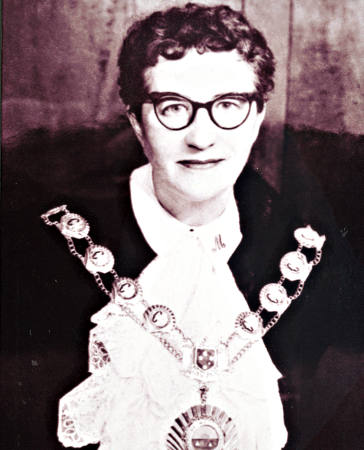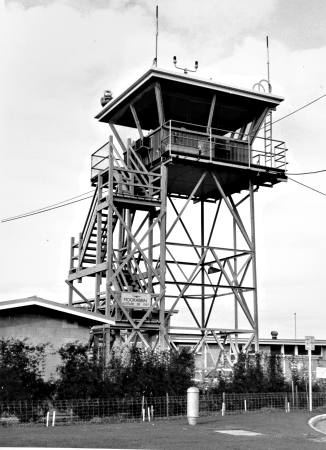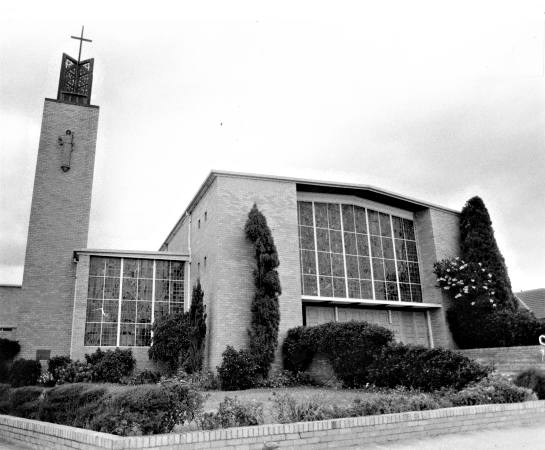Gertrude Josephine McKenzie: Aviatrix and Councillor

Cr Gertrude J McKenzie, Mayor of City of Mordialloc, 1958/59. Kingston Collection.
The decision of Gertrude McKenzie to stand in the 1955 municipal elections against a sitting councillor representing the ratepayers in the Mordialloc Ward caused surprise. After all, a woman in local government was rare and there had only ever been one woman in the Mordialloc council and that was twenty years earlier. The fuss was intensified when Mrs McKenzie unexpectedly defeated Cr Rendall by 859 votes to 705 to take her place at the Council table. [1] This was the beginning of a career spanning several torrid years in local government marked by controversy and conflict.
At the time of her election to the Mordialloc Council Gertrude McKenzie was not a newcomer to local government. She had been the mayoress of South Melbourne when her husband occupied the office of mayor and, as she explained, she attended all meetings where her husband presided and there learned local government procedures and became familiar with local affairs. Her husband died in 1946 leaving her a young widow who went on to pursue her interests in aviation. Gertrude McKenzie had gained her pilot’s licence, passing her exams at a higher level than her male colleagues on the course. During the World War II she contributed to the war effort in several ways including participating in flying exercises for the Anti-Aircraft Corporation, tasks that were not relished by her male colleagues. At the time of standing for council she was conducting a healthy business at the Moorabbin Airport called the McKenzie Flying School where she was involved in training seventy three student pilots. The Commonwealth Government had earlier recognized her work and gave her permission to purchase two new aircraft which she named “Faith” and “Hope”. When a third was approved it was to be named “Determination” rather than “Charity”, in part reflecting something of her own personality. [2][3]

Control Tower at Moorabbin Airport, c1970. Courtesy Eric Longmuir.
When McKenzie applied to sit for the examinations required to gain a pilots licence her application was treated with some scorn by those in authority. As she explained, “They thought a woman’s place was in the home over the wash tub.” [4] A similar situation existed when she revealed to friends that she had an interest in local government and intended to stand for the Mordialloc Ward in August 1955. When they incorrectly, pointed out that there had never been a woman on the Mordialloc Council that tipped the scales and reinforced her decision. A dogged and determined woman, Gertrude McKenzie pursued the enterprise with vigour.
Her admission to the council table was not easy. Cr Wentt made his position towards Cr McKenzie perfectly plain. He did not welcome her. Earlier he had said he’d be “inclined to resign should Mrs McKenzie get into Council.” [5] The reason he took this stance is not known. It may have been related to Cr McKenzie’s gender, to her personality, or to reasons he attributed to her for wanting to join Council. Wentt’s negative comment against the new councillor was reported in the local newspaper as an instance of bad manners. This labelling of his behaviour he challenged and called upon the mayor to support him as “in a democracy we can speak or not speak when we like.” The mayor responded by saying that his colleague was “certainly not rude but Cr Wentt was a bit off colour on the night in question.” [6]
The local newspaper in contrast urged the mayor to ensure that Cr McKenzie received polite and courteous treatment from all councillors; “conduct which gentlemen who do not even carry the honourable prefix of councillor, accord to women.” The reporter pointed out that even the most bitterly opposed individuals in politics act honourably towards each other, reflecting their education and good breeding. The newspaper reminded the community and her council colleagues that Gertrude McKenzie was far more distinguished in her own field of endeavour than most other councillors were in theirs. [7]
Almost immediately on becoming a councillor Gertrude McKenzie was embroiled in controversy, when a council meeting agenda item related to drainage problems on her property on Beach Road Mordialloc came up for consideration. McKenzie had written a letter to Council which drew the comment from Cr Wentt that Cr McKenzie had got onto Council for the express purpose of doing something about her own particular problem. The Council’s solicitor was consulted and he advised on the procedures that should be adopted. Cr Wentt wanted the Council to act on regulation 303 that empowered Council to demolish a building if it did not conform to building regulations but he had difficulty in gaining the agreement of his colleagues. A local newspaper reporter suggested the quality of the debate would not have done credit to a boys’ club and concluded his article with the comment, “Cr McKenzie created something of a record for a woman … she didn’t say a word.” [8]
The mayor, Cr Samuel, stepped into the feud between McKenzie and Wentt and warned that he would not permit attacks on personal issues. “Things were getting out of hand,” he said. Cr McKenzie had earlier warned she would go to the Prime Minister if necessary to obtain an assurance of courtesy from a fellow councillor. “I’ve stood as much as I can stand … I’ve reached the end of my tether,” she said. Although the Prime Minister may not have been any help to her, and perhaps it was a strange thing to say, her comment indicated that she was prepared to push the issue as far as necessary to get a satisfactory resolution. Cr Wentt said Cr McKenzie “was at liberty to take action if she wants to do so,” and indicated he “was not ashamed” of his action. [9]
Apart from the tussles with Cr Wentt, Gertrude McKenzie immediately set about gaining the removal of an onion factory located in Main Street, Mordialloc. Originally established in 1937, the factory, because of the odour emanating from it during the processing of onions, had become the source of complaint by many residents of Mordialloc. The Mordialloc City Council had been unsuccessful in gaining its closure despite decisions, stretching over several years prior to Cr McKenzie’s arrival, that all operations of the factory in its current location should cease. Gertrude McKenzie researched the legal position of the factory, organised a petition signed by 302 individuals, and spoke with officers of the Department of Labour and Industry only to discover that the factory was not registered. It took several years, but Gertrude McKenzie, while Mayor of Mordialloc in 1959, was able to announce that the operation of a vegetable dehydrating business at 524 Main Street, Mordialloc would cease in October of that year. It was a success that reflected her determination and stamina.
Gertrude McKenzie’s determination was to the fore in the previous year when she announced that she was a candidate for the position of mayor in the forth-coming municipal year. The position of mayor rotated amongst the three wards, with the senior councillor in the relevant ward taking on the role unless the sitting mayor was granted another term. This arrangement or convention had been established some years earlier, no doubt to avoid bickering and unpleasantness, and had worked successfully for some time. It was Mordialloc Ward’s turn and Gertrude McKenzie was the senior councillor so she believed the mayoral chain was hers by right. Apparently some of her colleagues thought otherwise. There were reports noted in the local paper of various explanations as to why Gertrude McKenzie should not be mayor; male councillors could not possibly sit under the chairmanship of a woman, her ability to hold down the job was queried and there was a rumour that she was intending to stand for parliament so she could not possibly hold down two jobs. Cr McKenzie said, “The idea that women can’t occupy public office went out with button-up boots,” and made it abundantly clear that if she was not appointed as mayor it would be an insult to herself as a woman, to her sex and to the ratepayers who elected her. In addition, she said in an open council meeting, “If a councillor junior to me was appointed as mayor it would be a personal insult.” [10]
The local paper once again came to her support, “Only people living in a back-water would have failed to grasp the fact that in this year of grace women are taking their rightful place in public affairs. The whispering campaign and personal canvassing among councillors should never have occurred.” [11] The writer posed the question, “Why should Mordialloc want to bar a woman?” and went on to remind his readers that over the thirty five years of the municipality’s history there had been a scattering of brilliant mayors but also some, unnamed, who were unsuitable, incompetent, and undignified. In his conclusion, he presented his judgement that Gertrude McKenzie was one of the State’s most outstanding women.
When the time came to appoint the new mayor, nearly one hundred people occupied the public gallery of the council chamber. Interest was high and the atmosphere was tense. The previous mayor, Cr Hawken, the chairman for the occasion called for nominations and almost immediately received two nominations; Cr Denyer and Cr McKenzie. Cr Denyer, a representative from Mordialloc Ward and McKenzie’s junior in terms of service was nominated by Cr Thomson and seconded by Cr Greaves. Cr McKenzie was nominated by Cr McLean and seconded by Cr Sambell. The chairman declared the vote a tie. Cr McKenzie immediately rose to draw his attention to a mistake in the count. After asking the councillors to indicate once again their vote the chairman acknowledged his error and announced the election of Cr Gertrude McKenzie as the first female mayor of Mordialloc. [12]
Following the donning of the mayoral robe and chain of office Cr McKenzie returned to the chamber to be installed in the mayoral chair by the previous mayor, only to find that Cr Hawken had taken a seat at the council table failing to observe the convention. Later in the mayor’s room the keys to the drink cupboard were handed over without the normal ceremony. These slights were taken quite seriously by some individuals who believed some councillors were carrying their disappointment and opposition too far concerning the election of a woman. The News said it was an unpleasant period in local municipal history and one that should never be repeated. [13] Cr Hawken in his own defence said he observed the practice employed when he was elected mayor twelve months earlier and he would not have been party to altering the procedures simply because it was Cr McKenzie. [14] In a letter published in the Mordialloc City News, Cr Hawken wrote that he had supported the nomination of Cr Denyer as mayor because he believed Denyer met the required criteria and was a very capable councillor. However, since Cr McKenzie was elected mayor, he offered her his full co-operation while acknowledging there would always be differences of opinion around the council table. Nevertheless, he believed there was no room for personal animosities. [15]
Gertrude McKenzie quickly settled into her new role as the first citizen in the municipality noting that the circumstances surrounding the mayoral election were only a ‘nine day wonder’ and she would be happy if they were not mentioned again. Given this attitude she embarked on her mayoral year. One of her early ‘innovations’ was the introduction of prayer at the beginning of each Monday meeting of Council. When first putting this proposal forward the town clerk informed her that in 1954 Council had rejected the idea of commencing Council meetings with prayer but this only drew the sharp response “If I like to stand here and say a prayer before the meeting opens, I don’t see who can stop me.” [16] This was just one situation that illustrated Gertrude McKenzie’s determination to implement what she considered important rather than what she was told was important. After all at that time Mordialloc was one of the few remaining municipal councils that did not begin meetings with a prayer.
At the conclusion of her mayoral year Cr McKenzie made it plain that she was far from satisfied with the treatment meted out to her by some councillors. While acknowledging the four councillors who had sufficient confidence in her abilities to vote for her appointment as mayor, (Crs McLean, Sambell, Burke and Weire) she asked that when another woman takes on the role of mayor, “Don’t do to her what you did to me. Don’t give her all the sorrow and grief that I had at the start of the municipal year.” [17] Cr Denyer said, “It has been a good year and to have a good year in any organization the drive must come from the top.” Cr Hawken was also modest in his praise and noted, “A Mayoral term is hard enough in good health, and I know it has been doubly hard with you, and we should double our congratulations in that regard.” [18]
It was during her mayoral year that Gertrude McKenzie was diagnosed with cancer and underwent surgery at the Mercy Hospital. She had put off seeking medical advice to enable her to carry on her duties as mayor but eventually because of her worsening condition was forced to enter hospital in a hurry. Her progress was seen to be satisfactory but The News while admiring her fighting spirit urged her to delay her return to the mayoral round. [19] Twenty months later Gertrude McKenzie resigned from Council as her health had deteriorated to such an extent that she could no longer continue the work of a councillor. Comments at the time acknowledged Gertrude McKenzie’s historic role as the first female mayor of the municipality of Mordialloc and her significant contribution in breaking down the male preserve in local government with her desire to represent the women of the community.
Three months after her resignation from Council, Gertrude McKenzie at 56 years of age was dead. A Requiem Mass was celebrated at St Brigid’s Church, Mordialloc and attended by councillors and many community representatives. Reflecting her contribution to the aviation industry several planes flew in close formation following the cortège to the New Cheltenham Cemetery where she was buried.

St Brigid’s Church, Mordialloc. Courtesy Kingston Collection.
Footnotes
- Mordialloc City News, September 1, 1955.
- Mordialloc City News, August 11, 1955.
- When Faith & Hope were formally christened by the then Rt Hon R G Casey he said in his speech, ‘Now, the concatenation of Faith and Hope are traditional, and you may say; “Where is the third. Charity”? Well … Charity is not here, and I don’t think Mrs McKenzie would want charity! I suggest that when the Club acquires a third aircraft, they call it, not Charity but Determination – because determination is one of the many qualities that Mrs McKenzie has very prominently in her make-up.’ But in the end ‘Charity’ was the name used. At one time Gertrude McKenzie operated eight aircraft with seven of them named. They were: Faith, Hope, Charity, Patience, Aires, Mischief and the Ugly Duckling. Information provided by Neil Follett.
- Mordialloc City News, August 11, 1955.
- Mordialloc City News, September 29, 1955.
- Mordialloc City News, September 29, 1955.
- Mordialloc City News, September 15, 1955.
- Mordialloc City News, December 1, 1955.
- Mordialloc City News, December 1, 1955.
- Mordialloc City News, August 28, 1958.
- Mordialloc City News, August 28, 1958.
- Mordialloc City News, September 4, 1958.
- Mordialloc City News, September 11, 1958.
- Mordialloc City News, September 17, 1958.
- Mordialloc City News, September 25, 1958.
- Mordialloc City News, September 25, 1958.
- Mordialloc City News, August 27, 1959.
- Mordialloc City News, August 27, 1959.
- Mordialloc City News, January 22, 1959.
